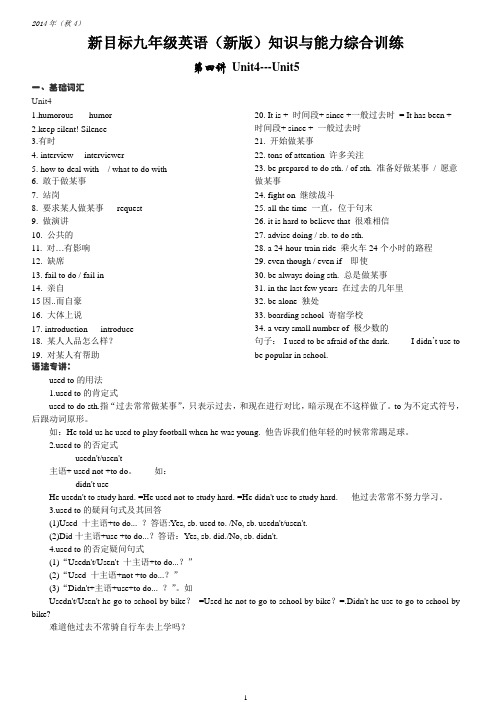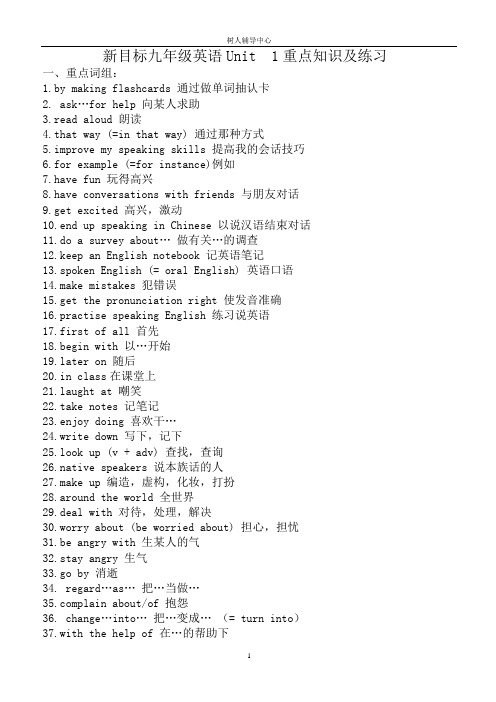2014年版新目标英语九年级unit1单元知识点(短语+句型+重难点句子+语法)
初中英语人教新目标九年级全一册unit1知识点

九年级英语全一册unit1知识点【重点单词】1.conversation n.对话have conversation with sb.与某人交谈2.pronounce v.发音pronunciaiton n.发音Please tell me how topronounce the word.What’s the pronunciation of the word “text”?【重点短语】1.ask sb.for help 请求某人的帮助2.read the textbook 读课文3.improve one’s speaking skills 提髙某人说的能力4.spoken English 英语口语5.get the main ideas 抓住主题6.make word cards制作单词卡片7.listen to tapes 听磁带8.read word by word逐字逐句地读9.be patient耐心点儿10.the secret to language learning语言学习的秘密11.be afraid to do sth.不敢做某事12.fall in love with…爱上……13.body language肢体语言14.look them up in a dictionary在词典里查阅它们15.take notes记笔记16.memorize sentence patterns记句型17.make mistakes in grammar犯语法错误18.learning habits学习习惯19.have sth.in common有.......共同,点20.pay attention to注意21.get bored变得无聊22.connect… with.….把.......与.......联系起来23.write down key words摘抄重点词24.after class课后25.be interested in…对……感兴趣26.in class在课堂上27.do sth.on one’s own 独立做某事28.do sth.bit by bit慢慢地做某事29.do sth.over and over again一遍又一遍地做某事30.worry about …为……而担忧31.depend on依赖;取决于32.Practce makes perfect.熟能生巧。
初中英语人教新目标九年级上册Unit1-4知识要点归纳

九年级英语上册Unit1-4知识要点归纳Unit1【重点短语】1.work with sb. 和某人一起学习2.make word cards 制作单词卡片3.listen to tapes 听磁带4.ask sb.for help 向某人求助5.study for a test 备考6.have conversations with 与……交谈7.a little 有点儿;稍微= a bit= kind of8.give a report 作报告9.at first 起初;起先反:at last 最后10.word by word 一词一词地;逐词11.the secret to... ……的秘诀12.fall in love with 爱上13.as well 也14.instead of 代替;反而15.so that 以便;为了16.make mistakes 犯错误= make a mistake17.be born with 天生具有18.the ability to do sth.做某事的能力19.depend on 视……而定;依靠;依赖20.have ...in common 在……方面有共同点21.be interested in 对……感兴趣= take an interest in22.pay attention to 注意;关注23.worry about 担心;担忧24.for example 例如25.get bored 感到无聊/厌倦26.think about 思考;思索27.be good at 擅长= do well in28.each other 彼此;互相29.find out 弄清;查明30.connect...with... 把……和……连接或联系起来31.look up (在词典、参考书中或通过电脑)査阅;拾头看32.repeat out loud 大声跟读33.take notes 做笔记34.keep a diary 写日记【重点语法】一、“by+v-ing形式”表方式、方法“by+v-ing形式”在句子中作状语,表示方式、手段、方法等,by在此结构中有“通过,借助,用(某种方式或方法)”等含义。
新目标英语九年级上册unit1-7重点短语

Unit1句型掌握:How do you study for a test?I study by……提建议 1. what about doing sth.? why not do sth? You’d better do sth.学习的方法:(1)working with friends (2) making flashcards 书本p2短语:1. by doing sth. 通过做某事 2. work with sb. 和某人一起工作,学习3. ask sb. for help 向某人寻求帮助4. practice doing sth. 练习做某事5. read aloud 大声地读6.speaking skills / spoken English 口语技巧/英语口语7. too + adj/adv. + to do sth. / so+ adj/adv.+that+句子/ not +adj/ adv.+enough to do sth. 太……而不能做某事(注意形容词用原级)8.ask sb. about sth. 询问某人关于某事9. the best way to do sth. 做某事最好的方法10.suggest sb. doing sth. 建议某人做某事(注意suggest 名词是suggestion 是可数名词)11. be different from 和……不同12.find sth. +adj 发现某事……13. get excited about doing sth. 做某事很兴奋14. to begin with 首先15. later on 然后16.It’s easy for sb to do sth. 做某事对某人来说很容易17. be afraid to do sth. 害怕做某事18. be afraid of sth. 害怕某物(注意接名词用of)19. decide to do sth. 决定做某事20. decide not to do sth. 决定不做某事21. have trouble doing sth, 做某事有困难22.deal with 处理23. unless 除非24. be angry with sb. 生某人的气25, be angry at sth. 对某事生气26. go by 过去消逝27. be in agreement 意见一致28. regard as 把……看作29. try one’s best to do sth. 尽某人最大的努力做某事30. with the help of ……在……的帮助下Unit21. used to do sth. 过去常常做某事否定句didn’t use to do sth. / used not to do sth.疑问句Did +主语+use to do sth?2. remember to do sth./ remember doing sth. 记得要做某事/ 记得做过某事3. go to bed 上床睡觉4. fall asleep 睡着5. be sleepy 困倦6. I go to sleep with the light on/ off 我开着/关着灯睡觉(意介词的意思)7. so +adj +a/an +n. such+a/an +adj.+n. 如此……8. 花费时间做某事可用spend/ take sb. spend time doing sth. / sb. spend time on sth.It takes sb. time to do sth.9. 花钱买某物可用spend/ cost/pay sb. spend money on sth.Sth. cost sb. money sb. pay money for sth.10. not any more 用法He doesn’t eat candy any more.No more/ no longer He no longer eats candy.11. chat with sb. 和某人聊天12. join + 组织、某人13. take part in + 运动会,活动14. look after well= take good care of 照顾好15. as +adj.+ one can= as+ adj. +as possible 尽力……16. be patient with sb. 对某人有耐心17. to one’s surprise 令某人惊奇的是18. even though= even if 即使,尽管19. take pride in = be proud of 对……感到自豪20. pay attention to doing sth. 注意做某事21. one of + 最高级最……之一22.give up doing sth. 放弃做某事23. die/ dead/ dying 死亡,(注意三个词的区别)p17.Unit 3情态动词的被动语态can/need/ should/ must be done (done是过去分词)可能被,需要被,应该被,肯定被短语1. allow sth. 允许某事2. allow sb. to do sth. 允许某人做某事3. allow doing sth. 允许做某事(没有sb.动词就用ing)4. be allowed to do sth.被允许做某事5. sixteen-year-old 十六岁的(相当于形容词)sixteen-year-olds 十六岁的人6. get one’s ears pierced 打耳洞(记得后面的动词加ed)8.instead of 代替9.so do I 我也这样/ so I do 我确实这样so+助动词+主语,so+主语+助动词He finished his homework, so ____ she 她也这样10.stay up__________11.fail a test ____________ pass a test____________12.concentrate on sth/ __doing_____ sth=pay attention to ___doing______ sth.13. be good for______________ be good with________ be good at__________14. both ……and _______________15. the chance/ opportunity to do sth. __________________the chance of doing sth______________________16.reply to _______________17..have 7 days off____________________18.clean up_________19. make one’s decision to do sth.__________________20.as much as21. sb. achieve____________ He_________ his dream.Sth. come true___________ His dream ______________.22.the importance of doing sth.23. care about sth.24.. success succeed successful 区别25 by+时间在……之前26. be strict with sb.27. neither ……nor 既不也不谓语就近原则28. either ……or 或者……或者谓语就近原则29.get in the way of sth. 挡道,妨碍30. be against doing sth 反对做某事31. happen to sb. 发生在某人身上Unit41. 复习虚拟条件句If+ 主语+ 一般过去时(注意be动词只能用were), 主语+ would+ do sth.一般的条件状语从句,主将从现2. get along with=get on with 和某人相处3..confident to do sth___________________have confidence in sth.4.give a speech_______________ 10. without permission____________5. with permission_________________- 12. be afraid to do sth.___________________6. what do you like?___________________________What is he like?________________________What does he look like?___________________________7.not……in the slightest_________________________ 他一点也不喜欢水果。
2014新目标新版九年级上 Unit1-4复习资料

2014年(秋4)新目标九年级英语(新版)知识与能力综合训练第四讲Unit4---Unit5一、基础词汇Unit41.humorous ---- humor2.keep silent! Silence3.有时4. interview ---interviewer5. how to deal with / what to do with6. 敢于做某事7. 站岗8. 要求某人做某事request9. 做演讲10. 公共的11. 对…有影响12. 缺席13. fail to do / fail in14. 亲自15因..而自豪16. 大体上说17. introduction --- introduce18. 某人人品怎么样?19. 对某人有帮助20. It is + 时间段+ since +一般过去时= It has been + 时间段+ since + 一般过去时21. 开始做某事22. tons of attention 许多关注23. be prepared to do sth. / of sth. 准备好做某事/ 愿意做某事24. fight on 继续战斗25. all the time 一直,位于句末26. it is hard to believe that 很难相信27. advise doing / sb. to do sth.28. a 24-hour-train ride 乘火车24个小时的路程29. even though / even if 即使30. be always doing sth. 总是做某事31. in the last few years 在过去的几年里32. be alone 独处33. boarding school 寄宿学校34. a very small number of 极少数的句子:I used to be afraid of the dark. I didn’t use to be popular in school.语法专讲:used to的用法ed to的肯定式used to do sth.指“过去常常做某事”,只表示过去,和现在进行对比,暗示现在不这样做了。
九英语Unit1重点知识及练习

新目标九年级英语Unit 1重点知识及练习一、重点词组:1.by making flashcards 通过做单词抽认卡2. ask…for help 向某人求助3.read aloud 朗读4.that way (=in that way) 通过那种方式5.improve my speaking skills 提高我的会话技巧6.for example (=for instance)例如7.have fun 玩得高兴8.have conversations with friends 与朋友对话9.get excited 高兴,激动10.end up speaking in Chinese 以说汉语结束对话11.do a survey about…做有关…的调查12.keep an English notebook 记英语笔记13.spoken English (= oral English) 英语口语14.make mistakes 犯错误15.get the pronunciation right 使发音准确16.practise speaking English 练习说英语17.first of all 首先18.begin with 以…开始ter on 随后20.in class在课堂上ught at 嘲笑22.take notes 记笔记23.enjoy doing 喜欢干…24.write down 写下,记下25.look up (v + adv) 查找,查询26.native speakers 说本族话的人27.make up 编造,虚构,化妆,打扮28.around the world 全世界29.deal with 对待,处理,解决30.worry about (be worried about) 担心,担忧31.be angry with 生某人的气32.stay angry 生气33.go by 消逝34. regard…as…把…当做…plain about/of 抱怨36. change…into…把…变成…(= turn into)37.with the help of 在…的帮助下38. compare…to (with)…把…和…作比较39.think of (think about) 想起,想到40.physical problems身体上的问题41.break off 中断,突然终止42. not…at all 根本不,全然不二、重点句子:1. How do you study for a test? 你怎样为考试做准备?2. I have learned a lot that way. 用那种方法,我已经学到了很多东西。
九年级第1单元短语及知识点总汇

九年级第1单元短语及知识点总汇在初中九年级的英语教学中,第1单元通常是非常重要的一个单元。
这个单元关乎着学生对英语学习的初步了解和认识。
因此,掌握这个单元的短语和知识点是学生们进一步提高英语水平的基础。
首先,我们来看一下这个单元中的一些重要的短语。
首先是"make friends",意为"交朋友"。
作为初中生活的开始,结交朋友是每个学生都需要面对的一个问题。
通过结交朋友,我们能够相互学习、交流和成长。
"Make friends"这个短语告诉了我们,友谊是我们成长道路上的一笔财富。
接下来,我们来看一下"take it easy"这个短语。
"Take it easy"的意思是"放轻松,别紧张"。
初中是每个学生一生中最为重要的阶段之一,我们需要适应新环境,面对新的挑战。
但是同时,我们也应该学会放松自己,不要过分紧张。
因为当我们感到紧张时,思考和学习效果会受到很大的影响。
因此,"take it easy"是我们应对挑战时需要时刻提醒自己的一句话。
除了这两个短语之外,第1单元还包含了许多其他重要的知识点。
例如,我们学习了一些关于衣服和颜色的词汇。
对于初学英语的学生来说,这些基础的词汇是非常重要的。
通过学习这些词汇,我们可以更好地描述我们所见到的事物,用英语进行简单的交流。
此外,我们还学习了数字的表达方式、询问时间和日期的方法。
对于我们来说,数字是生活中不可或缺的一部分。
我们需要数字来理解时间、计算成绩、购物等等。
因此,掌握数字和时间的表达方式是学好英语的基础。
除此之外,第1单元还教给了我们如何表达 "you're welcome"(不客气)和 "What's this in English?"(这个用英语怎么说?)。
新目标英语九年级Unit 1知识要点归纳

【词汇/短语小结】1.make vocabulary lists列词汇表2.by listening to tapes通过听磁带的方式3.study by working with a group通过参加学习小组进行学习4.practice doing sth.练习做某事5.improve one’s speaking skills提高某人说话的技能6.too...to...太……而不能……7.specific suggestions明确的建议8.add to增加add...to把……加到……add on附加,加上add together加起来add up to总共,总计9.not...at all根本不……;一点也不……10.have fun doing sth.做某事很开心11.get the pronunciation right使发音准确12.first of all首先ugh at嘲笑……;因……而发笑ter on后来15.take notes做笔记16.enjoy doing sth.喜欢做某事17.impress sb.with sth.将某事铭刻在某人的记忆里=impress sth.on/upon sb.=impress sth.on/upon one’s mind18.make up组成,构成19.be angry with sb.生某人的气20.try one’s best to do sth.尽力做某事【重点语句】1.This week we asked students at New Star High School about the best ways to learn more English.这个星期我们询问了新星中学的学生们学习更多英语的最好方法。
2.I don’t know how to use commas.我不知道怎样使用逗号。
3.You said you couldn’t understand peo-ple who talked fast.你说你听不懂那些讲话太快的人。
2014新目标英语九年级Unit1单词讲解及课文短语

Unit 1WORDS1. textbook n Cread the textbook2. conversation n Chave/practice conversations with sbmake up a conversation3. aloud1)aloud adv 大声地,出声地(不是默读)read aloud2)loud adj The music is very loud.adv 常在speak, talk等后,多用比较级Could you speak louder?特殊句play the CD too loudrepeat out loud3)loudly adv 喧闹Don’t talk loudly in public.课堂Please speak loudly.4. pronunciation n Upractice pronunciationthe pronunciation ofget the pronunciation rightimprove on e’s pronunciation----vi/vt pronounce5. sentence n Cmake a sentencesentence by sentence6. patientn C doctoradj be patient with sb---- n U patience lose one’s patience---- adv patiently---- impatient7. expression n C/Uthe expressions on one’s faceread with expression---- vt expressI can’t express how happy I am.8. discover vtdiscover truthI discovered that health is the most important.---- n U/C discovery1)discover指“发现”某种本来存在,而以前未被发现的事物或未为人所知的东西.I discovered (that) she was a good cook.2) invent (invention, inventor)指“发明”,即原来没有而后来发明创造的东西。
- 1、下载文档前请自行甄别文档内容的完整性,平台不提供额外的编辑、内容补充、找答案等附加服务。
- 2、"仅部分预览"的文档,不可在线预览部分如存在完整性等问题,可反馈申请退款(可完整预览的文档不适用该条件!)。
- 3、如文档侵犯您的权益,请联系客服反馈,我们会尽快为您处理(人工客服工作时间:9:00-18:30)。
掌握本单元33个单词、49个常用短语、17个重点句子、12个常考点。
by介词的功能及by短语的划线提问以及if、unless 等引导的状语从句,what引导的宾语从句,whether 引导的主语从句,that引导的定语从句重点短语1.by doing sth2.by working with a group通过同小组一起学习3.by making word cards通过制作单词卡片4.by listening to tapes通过听录音磁带5.by asking sb for help通过向某人求助6.by watching videos/ English programs通过看录像/英文节目7.by listening to a tape and repeating out loud通过听录音和大声重复朗读8.by having conversations with friends通过和朋友一起会话9.by taking notes, doing exercises and reading a lot通过记笔记、做大量的练习和阅读10.by writing e-mails to my pen pals通过给笔友写电子邮件11.by reading books and newspapers 通过读书看报12.by speaking English with my classmates 通过和同学讲英语13.by memorizing sentence patterns 通过记句型14.by doing grammar exercises 通过做语法练习15.by reading English books/magazines. 通过阅读英文书籍和杂志16.by writing in an English diary 通过写英文日记17.by using an English dictionary 通过用英语字典18.have conversations with sb同某人谈话19.too...to..太...而不能...---so…that…/ enough to do sth 的转换20.give a report作报告21.at first起初22.word by word逐词逐句地23.the secret to language learning 学习语言的秘诀24.be afraid to do sth害怕做某事=be afraid that+宾语从句be afraid of sth / doing sth 害怕…25.an English movie called Toy Story一部名叫《玩具故事》的英文电影26.fall in love with爱上...27.body language肢体语言28.as well也=too ;as well as 如同、和,连接主语时如同with(主谓一致要看前一主语,不能相加)29. a piece of cake小菜一碟;很容易的事30.It serves you right.活该,自作自受31.look up查阅;查找(主考点)32.so that以便;为了33.repeat out loud大声跟读34.sentence patterns句型35.spoken English英语口语36.make mistakes in doing sth 在...方面犯错by mistake 错误地mistake … for …把……误认为……37.the ability to do sth做某事的能力38.depend on视...而定;取决于;依靠39.pay attention to注意;关注40.connect...with... 把...和...连接或联系起来41.get bored感到厌烦42.try to do sth尽力做某事43.be stressed out焦虑不安的44.even if 即使45.think about 考虑;think of 想起;think over仔细考虑46.learn from 向……学习47.something new / interesting 新事物/有趣的东西48.be born with 天生具有49.Practice makes perfect.熟能生巧重点句子必背1.The teacher spoke so quickly that I did not understand her mostof the time.老师讲的如此快以致大部分时间我都理解不了她讲的。
(so…that…引导的结果状语从句)2. Although I could not understand everything the characters said,their body language and the expressions on their faces helpedme to get the meaning. 虽然我不能领会影片中人物所说的一切,但是他们的肢体语言和脸上的表情有助于我理解含义。
(although 引导的让步状语从句,不能和but连用)3. I want to learn new words and more grammar so that I canhave a better understanding of English movies. 为了对英语电影有更好的了解,我想学新单词和更多的语法。
(so that引导的目的状语从句---in order to do 转换同义句)4. Studies show that if you are interested in something, your brainis more active and it is also easier for you to pay attention to itfor a long time.研究表明如果你对某事物感兴趣,你的大脑就更活跃,也更容易长久地专注于此。
(It is +形容词+for sb to do sth.)5. If they need to learn English and they like music or sports, theycan listen to English songs or watch sports programs in English.如果他们需要学习英语,而且他们喜欢音乐或者运动,他们就可以听英语歌曲,或者看英语的体育节目。
(if引导的条件状语从句,主情从现)6. Even if you learn something well, you will forge t it unlessyou use it. 即使你很好地学到了某些知识,你也会忘记它,除非你使用它。
(even if 引导的让步状语从句;unless 引导的主将从现)7. Learning is a lifelong journey because every day bringssomething new. 学习是一个终生的过程,因为每天都会出现新事物。
(because引导的原因状语从句)8. I was afraid to ask questions because of my poorpronunciation. 由于语音不好的缘故,我害怕提问。
9. I fell in love with this喜欢上了这部既令人激动又有趣的电影。
(fall—fell ---fallen)10. I also realized I could get the meaning by listening for justthe key words. 我以为意识到可以通过只听关键词来理解含义。
realized +宾语从句(by +动名词,划线提问用----How)11. I discovered that listening to something interesting is thesecret to language learning.我发现听感兴趣的东西是学习语言的秘诀。
(动名词短语listening to…作主语谓语要用单数is)12. Everyone is born with the ability to learn.每个人生来就具有学习能力。
(复合不定代词作主语谓语用单数形式)13. But whether or not you can do this well depends on yourlearning habits.但是,学得好与否取决于你的学习习惯。
(whether引导主语从句,谓语要用单数)14. Good learners often connect what they need to learn withsomething interesting. 优秀的学习者经常会把他们需要学习的与有兴趣的东西联系起来。
(connect + what引导的宾语从句,what既引导宾从,又作need的宾语)(宾语从句三注意:连词,时态加语序)15. Good learners think about what they are good at and whatthey need to practice more. 优秀的学习者会思考他们擅长什么,他们需要更多的练习什么。
(介词about+宾从,what既引导宾从,又作介词at和及物动词need的宾语)16. Good learners will keep practicing what they have learned,and they are not afraid of making mistakes.优秀的学习者会不断练习他们已经学过的东西,而且他们不怕犯错误。
(keepdoing sth, practice +宾从)17.Everything that you learn becomes a part of you andchanges you, so learn wisely and learn well. (that引导定语从句,修饰先行词everything,复合不定代词作主语谓语用单数形式becomes)重点词语用法讲解+归纳考点1介词by1.by +doing sth.----划线提问用how①by reading the textbook;by asking the teacher for help②How can I learn English well?---By reading every morning.③介词by的其他用法:1)by+交通工具,“乘/坐...”by bus乘公共汽车2)by+地点,“在...的旁边;靠近...”by the lake在湖边3)by+时间,“截止到...;不迟于...”by ten十点前④常连用的短语:by the way 顺便问一下by accident= by chance 偶然地第 1 页共4 页by mistake 错误地one by one 一个接一个step by step 一步一步地little by little 逐渐地by the time 到……为止by oneself 独自地by hand 用手by the end of 到….... 末尾go/pass by 通过;经过by and by 不久以后⑤by与with, in 的区别:◆with 的用法:表示用某种工具(1) with +工具We like to write with a pen.(2)with+人体部位We see with our eyes.◆in 的用法:通常与“衣着、声音、书写材料”等名称连用in+语言in English 用英语in ink 用墨水speak in a loud voice大声地讲in red 穿红色的衣服考点2 find的用法及搭配①find+名词/代词+形容词(作宾补)②find+名词/代词+现在分词(作宾补)③find+名词/代词+不定式(作宾补)④find+名词/代词+副词(作宾补)⑤find+that从句(作宾语)⑥find+it(形式宾语)+形容词+for sb +to do sth(作真正宾语)⑦find out查清楚,弄明白;lost and found 失物招领I find Tom clever. 我发现Tom很聪明。
